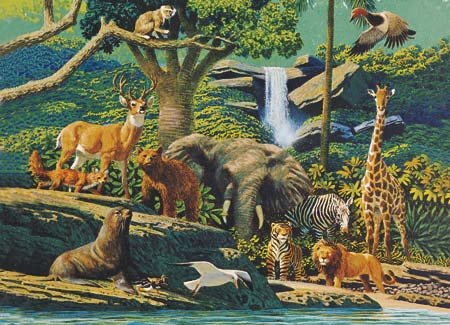This week we look at the implications of the difference between the subtle use of the phrase flesh and blood and flesh and bone; together with being formed of the the dust of the ground.
First a little look at the sequence in which these phrases are applied.
- Adam is formed of the
the dust of the ground - The breath of life is breathed in, to make Adam a "living soul"
- Adam is then placed in the garden of Eden
- Eve is created and defined as "now bone of my bones, and flesh of my flesh"
- Adam and Eve, as "living souls", in their bodies of
flesh and boneare immortal - Partaking of the forbidden fruit results in the fall and Adam and Eve become mortal
- They and their offspring now have bodies of
flesh and blood - Jesus has, in Mary, a mortal mother and takes on
flesh and blood - Jesus inherits power over death via His immortal Father
- After surrendering his life on the cross, Jesus is able to take it up again
- The resurrected Christ now has an immortal body of
flesh and bone - All bodies, both human and animal, in their mortal state, as we are most familiar with them, are
of the dustandflesh and blood
From the above sequence it is clear that the fall introduced not only sin and death to Adam and Eve but also blood into their then bodies of flesh and bone.
An immortal body of flesh and bone must then be animated and maintained by something besides circulating blood and that is what distinguishes it from a body of flesh and blood. It is this state that renders it immune to aging and other natural processes that make our current bodies fallen, susceptible to ailments and mortal.
It is the Spirit or Breath of Life that creates this condition.
On becoming mortal the spirit or breath of life that was breathed into Adam no longer performed this function. After the fall this spirit was not removed from Adam but simply the way it was bound to his body was changed.
Where previous to the fall, the spirit had been bound to Adam in an inseparable way and rendered it immortal. The spirit had been the primary animating force which maintained life in that state.
As a consequence of and post the fall, the spirit and body were now separable, more loosely bound and blood was the primary life maintaining medium within the body.
Blood had been received and a blood debt was owed.
Blood could now be lost, or the spirit could leave the body, resulting in death.
When the body has aged beyond a certain point or is damaged beyond repair the now more loosely bound spirit leaves that body as a person dies. This is the "ghost" that is referred to in the scriptural phrase of giving up the ghost.
Genesis 25:8 Then Abraham
gave up the ghost, and died in a good old age, an old man, and full of years; and was gathered to his people.
Genesis 35:29 And Isaac
gave up the ghost, and died, and was gathered unto his people, being old and full of days: and his sons Esau and Jacob buried him.
Job 3:11 Why died I not from the womb? why did I not
give up the ghostwhen I came out of the belly?
This is also the spirit or ghost that is referred to in relation to Christ surrendering up His life on the cross.
Matthew 27:50 Jesus, when he had cried again with a loud voice,
yielded up the ghost.
Mark 15:37 And Jesus cried with a loud voice, and
gave up the ghost.
Luke 23:46 And when Jesus had cried with a loud voice, he said, Father, into thy hands
I commend my spirit: and having said thus, hegave up the ghost.
This spirit or ghost referred to in all of these instances is not the Holy Ghost or Holy Spirit but the eternal individualized spirit that lives on after our death or separation from our bodies and will be reunited with our flesh in the resurrection enabled by Christ overcoming the fall.
Then will this spirit be bound to our flesh in an inseparable way and we will be immortal as Adam and Eve were in the garden of Eden.
The blood debt will have been settled through Christs atonement and the effects of the fall reversed.
Previous parts of this Series.
Were the seven days of creation in Genesis seven twenty four hour periods? - Delving a little deeper
Were the seven days of creation in Genesis seven twenty four hour periods? - Into the detail
Were the seven days of creation in Genesis seven twenty four hour periods? - Some conclusions
Were the seven days of creation in Genesis seven twenty four hour periods? - Some more conclusions
Were the seven days of creation in Genesis seven twenty four hour periods? - The implications.
The evolution of Adam - a conundrum
The evolution of Adam - Who is Adam
The evolution of Adam - Two trees and choice
The evolution of Adam - Partaking of the fruit and feeling naked
The evolution of Adam - Was there death before Adam
The evolution of Adam - The biological purpose of death.
The evolution of Adam - The need for a Redeemer
The evolution of Adam - Inheritance and Redemption

